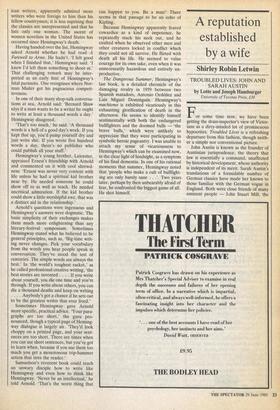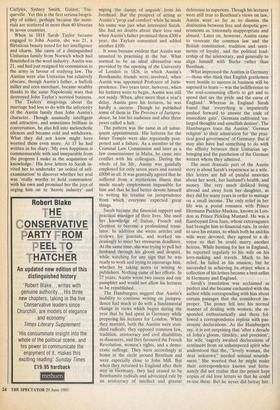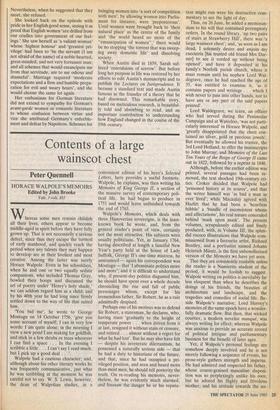A reputation established by a wife
Shirley Robin Letwin
TROUBLED LIVES: JOHN AND SARAH AUSTIN by Lotte and Joseph Hamburger
University of Toronto Press, £30
For some time now, we have been getting the drain-inspector's view of Victor- ians as a dirty-minded lot of promiscuous hypocrites. Troubled Lives is a refreshing departure from this fashion, though neith- er a simple nor conventional picture.
John Austin is known as the founder of Austinian jurisprudence, the theory that law is essentially a command, unaffected by historical development, whose authority is independent of its merit. Sarah Austin's translations of a formidable number of German classics have made her known to those familiar with the German vogue in England. Both were close friends of many eminent people — John Stuart Mill, the Carlyles, Sydney Smith, Guizot, Toc- queville. Yet this is the first serious biogra- phy of either, perhaps because the mate- rials are scattered in more than 40 libraries in seven countries.
When in 1814 Sarah Taylor became engaged to John Austin, she was 21, a flirtatious beauty noted for her intelligence and charm. She came of a distinguished Unitarian family from Norwich which had flourished in the wool industry. Austin was 21, and had just resigned his commission in the army in favour of studying law. The Austins were also Unitarian but relatively obscure, though Austin's father, a Suffolk miller and corn merchant, became wealthy thanks to the same Napoleonic wars that destroyed John Taylor's worsted business.
The Taylors' misgivings about the marriage had less to do with the inferiority of the Austin family than John Austin's character. Though unusually intelligent and attractive, and sometimes brilliant in conversation, he also fell into melancholic silences and became cold and withdrawn. What they did not know might have worried them even more. At 17 he had written in his diary: 'My own happiness is commensurable with and inseparable from the progress I make in the acquisition of knowledge.' His love letters to Sarah in- vited her to undertake 'an ordeal of self- examination' to discover whether her soul was 'really worthy to hold communion' with his own and promised her the joys of urging him on to 'heroic industry' and wiping 'the damps of anguish' from his forehead. But the prospect of acting as Austin's 'prop and comfort' while he made his name was just what interested Sarah. She had no doubts about their love and when Austin's father promised them £300 a year, the Taylors consented and added another £100.
It soon became evident that Austin was unsuited to practising at the bar. What seemed to be an ideal alternative was provided by the opening of the University of London in 1826, in which Austin's Benthamite friends were involved, when Austin was appointed Professor of Juris- prudence. Two years later, however, when his lectures were to begin, Austin was still not ready. When, after more than a year's delay, Austin gave his lectures, he was hardly a success. Though he published some of them in The Province of Jurispru- dence, he lost his audience and after three years called a halt.
The pattern was the same in all subse- quent appointments. His lectures for the Inner Temple were also repeatedly post- poned and a failure. As a member of the Criminal Law Commission and later as a law commissioner in Malta, he came into conflict with his colleagues. During the whole of his life, Austin was gainfully employed for only seven years and earned £8000 in all. It was generally agreed that he suffered from a mysterious illness that made steady employment impossible for him and that he had better devote himself to writing his treatise on jurisprudence from which everyone expected great things.
Sarah became the financial support and practical manager of their lives. She used her knowledge of Italian, French and German to become a professional trans- lator. In addition she wrote articles and reviews for journals, and worked un- ceasingly to meet her strenuous deadlines. At the same time, she was trying to pull her husband through his gloom and despair, while watching for any sign that he was ready to work and trying to encourage him, whether by taking notes or writing to publishers. Nothing came of her efforts. In 27 years, Austin wrote two essays and one pamphlet and would not allow his lectures to be republished.
The Hamburgers suggest that Austin's inability to continue writing on jurispru- dence had much to do with a fundamental change in views which began during the year that he had spent in Germany while preparing his lectures for London. When they married, both the Austins were stan- dard radicals: they opposed common law, tradition, aristocracy and civil disabilities as dissenters, and they favoured the French Revolution, women's rights, and a demo- cratic suffrage. They were accordingly at home in the circle around Bentham and were especially close to John Mill. But when they returned to England after their stay in Germany, they had ceased to be Benthamite radicals and advocated rule by an aristocracy of intellect and greater deference to superiors. Though his lectures were still true to Bentham's views on law, Austin went so far as to dismiss the distinction between free and despotic gov- ernments as 'extremely inappropriate and absurd.' Later on, however, Austin came to venerate the common law and the British constitution, tradition and senti- ments of loyalty, and the political lead- ership of the aristocracy, and generally to align himself with Burke rather than Bentham.
What impressed the Austins in Germany — those who think that English gentlemen were hostile to success in business will be suprised to learn — was the indifference to 'the soul-consuming efforts to get and to spend that are the pride and the curse of England.' Whereas in England Sarah found that 'everything is impatiently pushed forward to answer the ends of immediate gain', Germans cultivated 'en- larged thoughts and unselfish desires'. The Hamburgers trace the Austins' German religion' to their admiration for 'the prac- tical good government' of Germany. But it: may also have had something to do with the affinity between their Unitarian up- bringing and the pantheism of the German writers whom they admired.
The most dramatic part of the Austin story is about Sarah's experience as a wife. Her letters are full of painful anxieties about her work, her husband's health, and money. She very much disliked living abroad and away from her • daughter, as they did for many years in order to manage on a small income. The only relief in her life was a postal romance with Prince Hermann Puckler-Muskau, known in Lon- don as Prince Pickling Mustard. He was a flamboyant Don Juan, whose extravagance had brought him to financial ruin. In order to save his estates, to which both he and his wife were devoted, they agreed to a di- vorce so that he could marry another heiress. While hunting for her in England, he reported regularly to his wife on his love-making and travels. Much to his relief, he failed in his mission; but he succeeded in achieving its object when a collection of his letters became a best-seller in Germany and England.
Sarah's translation was acclaimed as perfect and she became enchanted with the author while corresponding with him about certain passages that she considered im- proper. The prince fell into his normal manner of dealing with women; she re- sponded enthusiastically and there fol- lowed a correspondence replete with pas- sionate declarations. As the Hamburgers say, it is not surprising that 'after a decade of John's gloom, timidity, and precision', his wife 'eagerly awaited declarations of sentiment from an unhampered spirit who understood that the, "lovely woman, the dear unknown" needed sensual nourish- ment.' She worried that he might make their correspondence known and fortu- nately did not realise that the prince kept copies of old love letters so that he could re-use them. But he never did betray her. Nevertheless, when he suggested that they meet, she refused.
She looked back on the episode with :pride in her English good sense, seeing it as proof that English women 'are drilled from our cradles into government of our feel- ings.' She saw herself as 'a valiant woman' whose 'highest honour' and 'greatest pri- vilege' had been to 'be the servant (I am not afraid of the name) of a noble-hearted, great-minded, and not very fortunate man; and all schemes that would emancipate me from that servitude, are to me odious and shameful'. Marriage required 'moderate expectations and a firm and humble prepa- ration for evil and weary hours', and she would choose the same lot again.
Her enthusiasm for German literature did not extend to sympathy for German's avant-garde women or romantic literature to whose confusion between virtue and vice she attributed Germany's enfeeble- ment and defeat by Napoleon. Schemes for bringing women into 'a sort of competition with men', by allowing women into Parlia- ment for instance, were 'preposterous'. Until women were brought back to 'their natural place' as the centre of the family and 'the world heard no more of the "emancipation of women",' there would be no stopping 'the torrent that was sweep- ing away domestic life' and dissolving society.
When Austin died in 1859, Sarah suf- fered 'convulsions of sorrow'. But before long her purpose in life was restored by her efforts to edit Austin's manuscripts and to publish the Lectures on Jurisprudence. It became a standard text and made Austin famous as the founder of a theory that he had disowned. This remarkable story, based on meticulous research, is beautiful- ly told and absorbing to read, and an important contribution to understanding how England changed in the course of the 19th century.




























































 Previous page
Previous page